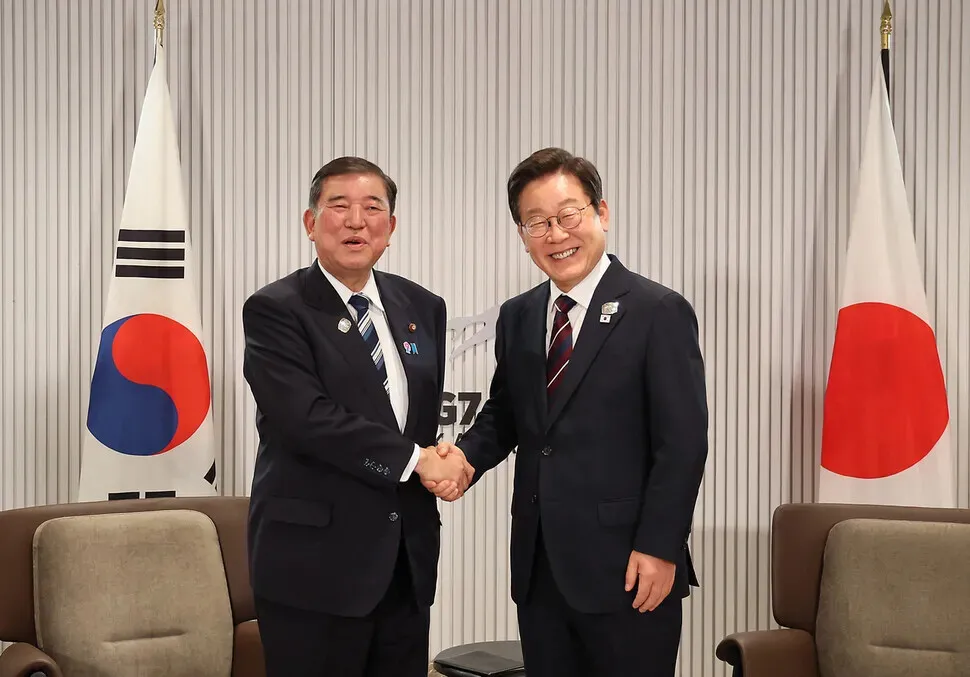
Japanese Prime Minister Shigeru Ishiba (left) and South Korean President Lee Jae Myung shake hands during their summit on the sidelines of the Group of Seven summit in Kananaskis, Canada, on June 17, 2025. (Kim Tae-hyeong/Hankyoreh)
The summit slated for Aug. 23 comes at a time when Korea and Japan must communicate and cooperate more closely than ever
Korean President Lee Jae Myung will be visiting Japan for a summit with Japanese Prime Minister Shigeru Ishiba before his first summit with the US.
The itinerary points to Lee’s determination to boost cooperation with Japan — Korea’s closest neighbor — by restoring “shuttle diplomacy” amid political volatility following Donald Trump’s return to the White House.
As it happens, 2025 is a historically significant year for Korea-Japan relations. This is the 120th anniversary of the Eulsa Treaty in 1905, when Korea became a protectorate of Japan; the 80th anniversary of Korea’s liberation from Japanese colonial rule; and the 60th anniversary of the two country’s normalization of diplomatic relations.
We hope that, through this summit, the two countries will forge a mature and balanced relationship in which they can stride toward the future while candidly acknowledging the events of the past.
Kang Yu-jung, a spokesperson for Lee’s presidential office, said Wednesday that Lee and Ishiba mean to use their summit to “reinforce the foundation for future-oriented bilateral cooperation and share opinions about ways to strengthen bilateral cooperation and trilateral cooperation with the US, about peace and stability in the region, and about regional and global issues.”
This is the first time since Korea and Japan normalized their diplomatic relations in 1965 that a Korean leader has visited Japan for a formal meeting before visiting the US.
Over the past 70 years, Korea and Japan have both resolved their security issues through bilateral alliances with the US and achieved economic prosperity through the system of free trade provided by the US.
But both of those pillars have begun to tremble since the rise of Trump, which makes proactive communication and cooperation even more important.
Notably, the tariff deals that Korea and Japan reached with the US last month require both countries to set up massive US investment funds (US$550 billion for Japan and US$350 billion for Korea). Seoul and Tokyo will need to be in close communication as they work on implementing the terms of those deals.
The same goes for “alliance modernization,” a key item on the agenda of the Korea-US summit on Aug. 25. Since changes in the Korea-US alliance have a direct impact on the US-Japan alliance and Korea-US-Japan security cooperation, Japan will try to have its own interests accommodated, one way or another.
Numerous other issues merit a detailed discussion, including cooperation on AI and semiconductors, reinforcing supply chains, and cooperating on Korea’s admission to the Comprehensive and Progressive Agreement for Trans-Pacific Partnership (CPTPP).
But lest we forget, all such cooperation must be predicated on a humble and honest understanding of our painful history.
Koreans can’t help wondering what Ishiba will say in his upcoming statement on the 80th anniversary of the end of World War II. One hopes he will exhibit more sincerity than his predecessor Shinzo Abe did in his 2015 statement, on the 70th anniversary, when he essentially proposed sweeping history under the rug.
Please direct questions or comments to [english@hani.co.kr]


AloJapan.com